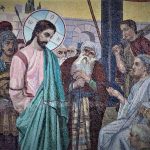The Mystery of Christ in the Bible
God has revealed many things to us, but there are also many things God has withheld that remain mysteries. But one mystery, that of the Messiah, has been fully revealed. So, if that’s true, what did Paul mean when he wrote about the “mystery of Christ?” Are there important truths about Christ in the Bible for which God intentionally withholds understanding? Is Christ too mysterious to understand?
The secret things of God
Consider Moses’ words in Deuteronomy:
The secret things belong to the Lord our God, but the things revealed belong to us and to our children forever, that we may follow all the words of this law. (Deuteronomy 29:29)
There are many things that God has chosen not to reveal to us, including facts about the physical universe and his creation. But for the truths that he revealed to the Israelites, his words were meant to be understood so the people could follow God’s commands. In other words, he didn’t give commands or ask them to believe something and then intentionally withhold meaning and understanding from them.
For us today, the Bible is God’s Word, given for us to understand. There are no “hidden meanings” behind the plain wording of Scripture. But we can only understand if our hearts are open.
Prophetic mystery
God gave the Bible for our understanding, but that doesn’t mean everything in it is easy to understand. The apocalyptic writings of the Bible are not written in plain wording, as they contain many metaphors and symbols whose meanings are not always obvious and are much debated.
For example, the book of Revelation refers to “Mystery Babylon” (Revelation 17:5), the meaning of which is highly debated among Bible commentators. Also, the prophetic writings of Daniel are still shrouded in much mystery, in that we still don’t have the complete meanings of the images that God gave him and how they will be fulfilled.
The mystery of the Messiah
The Old Testament believers knew about the Messiah, as he was described in many passages in the Old Testament. But they struggled to understand when and how he would come, and how they would be able to recognize him. As the apostle Peter explained:
Concerning this salvation, the prophets, who spoke of the grace that was to come to you, searched intently and with the greatest care, trying to find out the time and circumstances to which the Spirit of Christ in them was pointing when he predicted the sufferings of the Messiah and the glories that would follow. It was revealed to them that they were not serving themselves but you, when they spoke of the things that have now been told you by those who have preached the gospel to you by the Holy Spirit sent from heaven. Even angels long to look into these things. (1 Peter 1:10-12)
The “grace that was to come” refers to how God would bless the nations through the Messiah as promised to Abraham. Salvation would come to all nations. But the prophets of old didn’t understand how God would fulfill this promise—they only saw a glimpse. Even the angels weren’t allowed to understand.
Technically, you can’t believe a truth that is hidden, you can only believe the part of it that is revealed. The Old Testament saints didn’t understand the Messiah much since they couldn’t see him yet. But their faith in him was based on what God had revealed in his promise.
Jesus and the gospel
So, the Messiah remained a mystery for many ages. But God’s revelation has now been made plain. Christ has appeared and his identity revealed: Jesus of Nazareth. What was a mystery before is now revealed, in the open, and proclaimed as good news: the King has arrived! Jesus instructed his disciples:
What you have said in the dark will be heard in the daylight, and what you have whispered in the ear in the inner rooms will be proclaimed from the roofs. (Luke 12:3)
The gospel of the kingdom that the disciples heard Jesus teach in private was to be proclaimed to anyone and everyone, starting with the Jewish people. But those who rejected the message would not have unlimited opportunities:
Whenever you enter a house, stay there until you leave that town. And if any place will not welcome you or listen to you, leave that place and shake the dust off your feet as a testimony against them.” (Mark 6:10-11)
Jesus taught his disciples how God would reveal truth in the spreading of his kingdom:
He said to them, “Do you bring in a lamp to put it under a bowl or a bed? Instead, don’t you put it on its stand? For whatever is hidden is meant to be disclosed, and whatever is concealed is meant to be brought out into the open. If anyone has ears to hear, let them hear.” (Mark 4:21-23)
The truths about the Messiah that were hidden in the past were now revealed to the apostles. The King had come, and his disciples were to spread this good news like someone who places a lamp so the light can shine in every part of the room. But only those who have ears to hear—in other words those who are listening and are seeking—would benefit from the light.
Paul’s use of “mystery”
The apostle Paul frequently used the term mystery (Greek mysterion) in his teaching. To the Greeks, a mysterion was a secret or a hidden truth that was only known through revelation. Paul described the following as mysteries:
- The temporary hardening of Israel to the gospel of Jesus (Romans 11:25)
- God’s wisdom revealed in Christ (1 Corinthians 2:7)
- The believer’s transformation at the coming of Christ (1 Corinthians 15:51)
- God’s plan to bring everything together in Christ (Ephesians 1:9-10)
- Jews and Gentiles being coheirs with Christ (Ephesians 3:6)
- Christ indwelling every believer (Colossians 1:27)
We should note that every one of these references concerns Christ. In Paul’s mind, Christ is the center of God’s plan for humanity and thus the center of our faith. Also note that Paul intended his readers to understand these teachings. Because of their faith in Christ, they would no longer remain mysteries to them.
The mystery of the gospel
Paul also used the term “mystery of Christ” and referred to the gospel of Jesus as a mystery:
Surely you have heard about the administration of God’s grace that was given to me for you, that is, the mystery made known to me by revelation, as I have already written briefly. In reading this, then, you will be able to understand my insight into the mystery of Christ, which was not made known to people in other generations as it has now been revealed by the Spirit to God’s holy apostles and prophets. This mystery is that through the gospel the Gentiles are heirs together with Israel, members together of one body, and sharers together in the promise in Christ Jesus. (Ephesians 3:2-6)
The mystery of Christ was hidden for ages, but now has been made known to the apostles, who were to reveal it to the nations. This mystery was that salvation has come through Jesus Christ, and now is opened up to both Jews and Gentiles. And both share together in this salvation to form one body, the church.
Since Christ has been revealed, the gospel was meant to be declared openly, in fact shouted from the roof tops. It was not meant to be shrouded in darkness, so that only the “enlightened” and privileged could understand it.
Gnosticism in the church
Soon after it began, the Colossian church was exposed to an early form of Gnosticism. Teachings contrary to the gospel had infiltrated this infant body of believers. The Gnostics believed that the human body was unspiritual, and physical existence was inferior. Salvation from the physical was thought to be attained through an awakening to the true knowledge (gnosis) of a person’s divine identity. Only a select group of privileged people could realize salvation and the truth of God, while to all others they remained a mystery. With Gnosticism, the average person had no hope of attaining true spiritual knowledge, but only the “chosen few.”
Paul addressed these false teachings in his letter to the Colossians:
I have become its servant by the commission God gave me to present to you the word of God in its fullness—the mystery that has been kept hidden for ages and generations, but is now disclosed to the Lord’s people. To them God has chosen to make known among the Gentiles the glorious riches of this mystery, which is Christ in you, the hope of glory. (Colossians 1:25-27)
My goal is that they may be encouraged in heart and united in love, so that they may have the full riches of complete understanding, in order that they may know the mystery of God, namely, Christ… (Colossians 2:2)
Paul taught that the true mystery of God is the gospel of Jesus Christ, and that now it’s no longer a mystery, but uncovered for all to hear, understand, and accept. Christ is the full revelation of God—Emmanuel, God with us, revealed in the flesh. He is the Logos, the complete wisdom of God and the truth of God, revealing God’s essence, mind, and innermost thoughts.
This gospel was now to be proclaimed in its fulness to all, even the Gentiles! To those who hear and desire to know—Paul calls them “the Lord’s people”— God will give understanding. But to those who refuse to listen, even Jews, his word will remain a mystery.
Gnosticism’s continued influence
Unfortunately, Gnostic teachings continued to influence the church even up to the Middle Ages. Before his conversion to Christ, Augustine of Hippo (354-430 AD) had been deeply involved in Manichaeism (a dualistic and deterministic form of Gnosticism). And these Manichean beliefs strongly influenced his theology as a Christian. Augustine developed what is now called “divine determinism.” This is the belief that God predetermines all human events and also preselects those who will receive eternal salvation and those who will receive eternal damnation. This belief of “the chosen few” has significantly influenced the theology of some major Christian churches up to today.
Common usage of “mystery”
Now, it’s a common practice in the evangelical church, when we don’t understand something we read in Scripture, to give it the label of mystery. But sometimes this is just an easy escape from actually having to study the Bible.
Or when confronted with two apparently conflicting Bible teachings, we describe it as a mystery. For example, many Christians believe that humans have free will to be able to believe the gospel to receive the gift of salvation, but at the same time believe that God chooses who will be saved. The two teachings obviously are in conflict, so to live with both, they say it’s a mystery.
But this would imply that God is intentionally keeping the meaning from us. If something isn’t called a mystery in Scripture, then we shouldn’t call it that either. Instead of labeling apparently conflicting passages a mystery, we should devote time in Bible study to try to harmonize them.
Mystery of the gospel summarized
Theologians continue to vigorously debate biblical prophecy. But all Christian theologians agree that Christ was God’s final revelation to humanity the Old Testament prophets spoke of. Paul wrote:
Beyond all question, the mystery from which true godliness springs is great: He appeared in the flesh, was vindicated by the Spirit, was seen by angels, was preached among the nations, was believed on in the world, was taken up in glory. (1 Timothy 3:16)
In this passage Paul summarizes the historical facts of the coming of Christ: the incarnation, God’s affirmation of Christ’s Sonship, Christ’s resurrection, the Great Commission, and his ascension. These were considered a mystery in earlier times but there is now no mystery. Christ is the fulfillment of all God’s promises concerning salvation and the kingdom of God.
The Great Commission
And Jesus commissioned the apostles to preach this good news to the ends of the earth: first to Israel, and now to all people, who live in the “Messianic age”:
All authority in heaven and on earth has been given to me. Therefore go and make disciples of all nations, baptizing them in the name of the Father and of the Son and of the Holy Spirit, and teaching them to obey everything I have commanded you. And surely I am with you always, to the very end of the age. (Matthew 28:18-20)
As part of fulfilling this commission, the gospel story was recorded. The apostles also wrote letters (the epistles) which were circulated among the churches. Along with the gospels, these were later assembled together to become the New Testament. These documents were written for people to understand, not hidden in darkness or to be obscured by shaded meanings. Although some passages in the apostles’ letters were difficult to understand, any ambiguity was not intentional.
Everything we read in the gospels and epistles was intended to be the final word on what Jesus did and taught and how his teachings were to be applied in believers’ daily lives. The authors’ intent was that the readers understand what they wrote. In contrast to the teachings of the Gnostics, there were to be no “mystery” truths that only the initiated few could understand. As Paul wrote to the Corinthian church:
For we do not write you anything you cannot read or understand. (2 Corinthians 1:13)
Assurance for the believer
And we can have full confidence that God’s great promises concerning our life in Christ are sufficient:
His divine power has given us everything we need for a godly life through our knowledge of him who called us by his own glory and goodness. Through these he has given us his very great and precious promises…. (2 Peter 1:3-4)
There are many mysteries in the universe—things we don’t yet understand. But the one thing that’s not a mystery is the coming of Christ. God’s Messiah has been revealed and made plain, and now to be proclaimed throughout the earth. Eternal life is offered as a gift to all who will receive it. It’s not withheld from anyone who desires it. And there’s no need to worry that the believer in Christ is missing out on some great truths of God. God revealed to us all we need to know through the coming of Jesus Christ as recorded in the holy Scriptures.
Christ in Scripture is listed on Feedspot Top 200 Christian Blogs.







3 thoughts on “The Mystery of Christ in the Bible”
Having raised the contradiction of free will vs predestination I hoped you’d resolve it but I was disappointed in this respect. Also I don’t think the Greek word mysterion means what we think of, as a mystery, namely a puzzle or inexplicable matter.
Richard, Thanks for your comments. I do deal with predestination and election in the following Christ in Scripture articles: Predestination in the Bible?, and Who Are the Elect in the Bible? Though they are short articles, I think they will answer your most pressing questions about the topic of free will and God’s sovereignty in salvation. Regarding the Greek word “mysterion” used in the biblical texts, my article does assume the standard definition of the word which is “a secret or hidden truth made known through revelation.” I added a short sentence to the article to clarify that.
Thank you, Scott, for replying to my comment, much appreciated. Those articles on predestination are also very helpful,
Richard